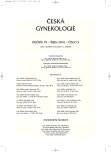Possibility to identify fetomaternal haemorrhage
Authors:
M. Studničková 1
; M. Lubušký 1; M. Ordeltová 2; M. Procházka 1
Authors‘ workplace:
Porodnicko-gynekologická klinika FN, Olomouc, přednosta doc. MUDr. R. Pilka, Ph. D.
1; Oddělení alergologie a klinické imunologie FN, Olomouc, přednosta doc. MUDr. J. Bystroň, CSc.
2
Published in:
Ceska Gynekol 2010; 75(5): 443-446
Overview
Fetomaternal haemorrhage (FMH) is a status characterised by penetration of fetal blood into the maternal circulation which happens mostly at delivery. FMH may cause erythrocytal alloimmunisation of woman. That is why anti-D immunoglobulin (IgG anti-D) is being administered to RhD negative women after delivery of RhD positive fetus. IgG anti-D is administered to RhD negative women standardly and in much greater quantities than is actually necessary. However, on the other hand, it is not possible to diagnose cases where a greater dose is required. To optimalise prevention of RhD alloimmunization in RhD negative women, it is important to diagnose conditions where fetomaternal haemorrhage (FMH) occurs, precisely define its volume and consequently administer the required dose of IgG anti-D. The ability to reliably detect fetomaternal haemorrhage (FMH) and precisely define its volume would allow better and less expensive prevention of RhD alloimmunization in RhD negative women. IgG anti-D could thus be administered only in cases that are actually indicated and only in doses necessary for preventing RhD alloimmunization. Accurate quantification of FMH is determined by flow cytometry.
Design:
Review.
Setting:
Department of Obstetrics and Gynecology, Department of Alergology and Clinical Immunology, University Hospital Olomouc.
Key words:
fetomaternal haemorrhage, flow cytometry, Kleihauer-Betke test, anti-D immunoglobulin, RhD alloimmunisation.
Sources
1. Augustson, BM., Fong, EA., Grey, DE., et al. Postpartum anti-D: can we safely reduce the dose? MJA, 2006, 184, p. 611–613.
2. Australian & New Zealand Society of Blood Transfusion Inc. Guidelines for laboratory assesment of fetomaternal haemorrhage, 2002, Australia.
3. Dziegiel, MH., Nielsen, LK., Berkowicz, A. Detecting fetomaternal hemorrhage by flow cytometry. Curr Opin Hematology, 2006, 13, p. 490–495.
4. Fernandes, BJ., von Dadelszen, P., Fazal, I., et al. Flow cytometric assessment of feto-maternal hemorrhage; a comparison with Betke-Kleihauer. Prenatal Diagnosis, 2007, 27, p. 641–643.
5. Fetal Cell Count Kit, IQ Products, příbalový leták.
6. Fetální hemoglobin, Sigma – Aldrich, příbalový leták.
7. Hadley, A., Soothill, P. Alloimmune disorders of pregnancy: anaemia, thrombocytopenia and neutropenia in the fetus and newborn. Cambridge University Press, 2002.
8. Lubušký, M. Prevence RhD aloimunizace. Evidence Based Medicine a přehled doporučených postupů. Postgrad Med, 2010, 12(2), s. 194-198.
9. Moise, Jr, JM. Management of rhesus alloimmunization in pregnancy. Obstet Gynecol, 2008, 112, p. 164–176.
10. Pelikan, DM., Scherjon, SA., Kanhai, HH. The incidence of large fetomaternal hemorrhage and the Kleihauer-Betke test. Obstet Gynec, 2005, 106, p. 642-643.
11. Pelikan, DM., Scherjon, SA., Mesker, WE., et al. Quantification of fetomaternal hemorrhage: A comparative study of the manual and automated microscopic Kleihauer-Betke tests and flow cytometry in clinical symplex. Am J Obstet Gynecol, 2004, 191, p. 551-557.
12. Porra, V., Bernard, J., Gueret, P., et al. Identification and quantification of fetal red blood cells in maternal blood by a dual-color flow cytometric method: evaluation of Fetal Cell Count kit. Transfusion, 2007, 47, p. 1281–1289.
13. Savithrisowmya, S., Singh, M., Kriplani, A., et al. Assessment of fetomaternal hemorrhage by flow cytometry and Kleihauer-Betke test in Rh-negative pregnancies. Gynecol Obstet Incest, 2008, 65, p. 84–88.
14. Salim, R., Ben-Shlomo, I., Nachum, Z., et al. The incidence of large fetomaternal hemorrhage and the Kleihauer-Betke test. Obstet Gynecol, 2005, 105, p. 1039-1044.
15. Smart, E., Armstrong, B. Blackwell Publishing Ltd, Blood group systéme. ISBT Science Series, 2008, 3, p. 68–92.
Labels
Paediatric gynaecology Gynaecology and obstetrics Reproduction medicineArticle was published in
Czech Gynaecology

2010 Issue 5
-
All articles in this issue
- Forceps delivery - an outdated obstetric technique?
- Vacuumextraction
- Lesions of peripheral nerves in obstetrics and gynecology. A review
- Analysis of uterine ruptures in Vysočina region in 5 years period
- Streptococci group B in perinatology
- Analysis of the set of pregnancy women with asthma bronchiale
- Possibility to identify fetomaternal haemorrhage
- Laboratory and clinical indicators of the state of the newborn after birth
- Changes in the developmental outcome of very low and extremely low birth weight infants at 24 months’ corrected age born in 1997–2007
- Psychosocial interventions by stillbirth in history and today
- Recurrent spontaneous ovarian hyperstimulation syndrome
- Safety of TVT-O
- The efficiency of oral contraception containing drospirenone in treating symptoms of premenstrual syndrome or premenstrual dysphoric disorder in gyneacology practice
- Hormonal treatment effectivity in hyperandrogenic syndrome
- Czech Gynaecology
- Journal archive
- Current issue
- About the journal
Most read in this issue
- Laboratory and clinical indicators of the state of the newborn after birth
- Vacuumextraction
- Lesions of peripheral nerves in obstetrics and gynecology. A review
- The efficiency of oral contraception containing drospirenone in treating symptoms of premenstrual syndrome or premenstrual dysphoric disorder in gyneacology practice
